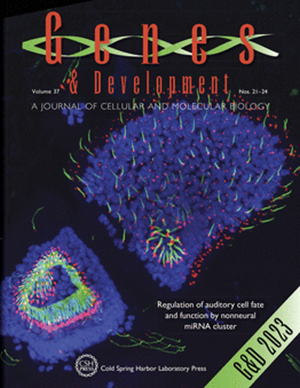UPR缺乏导致生长不良,非整倍性,以及ER和酵母中一般蛋白质停滞之间的权衡
IF 7.7
1区 生物学
Q1 CELL BIOLOGY
引用次数: 0
摘要
未折叠蛋白反应(UPR)是在出芽酵母中发现的一种允许细胞适应内质网(ER)应激源的机制。虽然UPR被认为不是野生型细胞在没有压力的情况下的细胞适应性所必需的,但我们发现UPR缺乏导致循环有丝分裂酵母细胞生长不良。这导致了在不同菌株背景中看到的特定染色体的普遍适应性非整倍体,表明该途径的重要基础作用被最常见的实验室衍生菌株的研究所忽略。非整倍体upr缺陷细胞比整倍体upr缺陷细胞生长得更好,但表现出更高的一般蛋白酶抑制应激,这是野生型细胞非整倍体的标志。编码在非整倍体染色体上的内质网蛋白酶抑制关键基因的调节可以表型化非整倍体的影响,这表明upr缺陷细胞成为非整倍体的原因是为了抵消内质网中的蛋白质折叠应激。蛋白质组学分析表明,应激诱导的一小部分UPR靶点的表达受到基础UPR活性的支持,包括伴侣蛋白Kar2/BiP。总之,我们的研究结果揭示了UPR在基线内质网折叠中的一个意想不到的作用,这对于保护细胞适应性非常重要,细胞耐受非整倍体导致的大量蛋白质抑制成本,以抵消其损失。本文章由计算机程序翻译,如有差异,请以英文原文为准。
UPR deficiency leads to poor growth, aneuploidy, and a trade-off between ER and general proteostasis in yeast
The unfolded protein response (UPR) was discovered in budding yeast as a mechanism that allows cells to adapt to endoplasmic reticulum (ER) stressors. Although the UPR is not thought to be necessary for cellular fitness of wild-type cells in the absence of stress, we found that UPR deficiency led to poor growth in cycling mitotic yeast cells. This led to pervasive adaptive aneuploidy of specific chromosomes that was seen in divergent strain backgrounds, indicating an important basal role for this pathway that was missed by studies of the most common laboratory-derived strains. Aneuploid UPR-deficient cells grew better than euploid UPR-deficient cells but exhibited heightened general proteostatic stress, a hallmark of aneuploidy in wild-type cells. Modulation of key genes involved in ER proteostasis that were encoded on aneuploid chromosomes could phenocopy the effects of aneuploidy, indicating that the reason UPR-deficient cells become aneuploid is to counteract protein folding stress in the ER. Proteomic analyses indicate that expression of a small subset of stress-induced UPR targets is supported by basal UPR activity, including the chaperone Kar2/BiP. Together, our results reveal an unexpected role for the UPR in baseline ER folding that is important enough to safeguard cellular fitness that cells tolerate the substantial proteostatic costs that result from aneuploidy to counteract its loss.
求助全文
通过发布文献求助,成功后即可免费获取论文全文。
去求助
来源期刊

Genes & development
生物-发育生物学
CiteScore
17.50
自引率
1.90%
发文量
71
审稿时长
3-6 weeks
期刊介绍:
Genes & Development is a research journal published in association with The Genetics Society. It publishes high-quality research papers in the areas of molecular biology, molecular genetics, and related fields. The journal features various research formats including Research papers, short Research Communications, and Resource/Methodology papers.
Genes & Development has gained recognition and is considered as one of the Top Five Research Journals in the field of Molecular Biology and Genetics. It has an impressive Impact Factor of 12.89. The journal is ranked #2 among Developmental Biology research journals, #5 in Genetics and Heredity, and is among the Top 20 in Cell Biology (according to ISI Journal Citation Reports®, 2021).
 求助内容:
求助内容: 应助结果提醒方式:
应助结果提醒方式:


